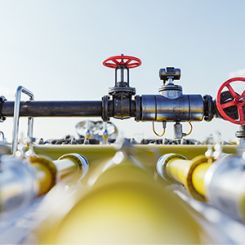
Editor’s Note: Read Part 1 from the August 2025 issue of Pumps & Systems here.
Challenges & Solutions in Implementation
The proper implementation of air compressors in power generation is essential to maximize benefits. Though initial challenges may arise, numerous solutions exist to ensure a safe and successful integration.
Initial investment: Despite high upfront costs, financial strategies like leasing and phased implementation can make the transition manageable. Seeking grants and subsidies can also offset these expenses.
System compatibility: Assess and upgrade existing infrastructure to ensure seamless integration of air compressors. Customizable compressor solutions can facilitate smooth incorporation into current systems.
Skill gaps: Implement comprehensive training programs to equip staff with the necessary skills for operating and maintaining air compressors. Regular training updates ensure continued proficiency.
Maintenance: Establish proactive maintenance schedules and use predictive maintenance technologies to minimize downtime. Keeping an inventory of spare parts can further reduce operational risks.
Regulatory compliance: Ensure air compressors meet environmental standards to avoid fines and promote sustainability. Regular audits and updates help maintain compliance with evolving regulations.
Real-World Applications
1. Gas turbine power plants: Compressed air is used for purging and cooling turbines, as well as powering control systems. Reliable air compressors are critical to maintaining consistent and efficient turbine operation.
2. Coal-fired power plants: In addition to supporting ash handling systems, air compressors enable efficient fuel atomization and ensure the proper functioning of pneumatic tools during maintenance.
3. Renewable energy facilities: While air compressors are less common in renewable energy systems, they play a role in maintenance and operational support for wind and solar power plants, particularly in hybrid setups.
The Future of Air Compressors in Power Generation
As the power generation industry evolves, air compressors will continue to play a vital role in supporting new technologies and meeting emerging challenges. With innovations such as smart compressors equipped with Internet of Things (IoT) capabilities, these advancements have allowed air compressors to integrate seamlessly with other plant systems, facilitating real-time monitoring and predictive maintenance. This integration enhances overall efficiency and reliability. Furthermore, the IoT technology provides professionals with valuable performance metrics, empowering them to make data-driven decisions and optimize the entire power generation process.
Additionally, the shift toward cleaner and more sustainable energy sources will drive demand for air compressors that can support low-emission power generation. For example, advanced compressors will be integral to hydrogen-powered systems, where precise air delivery is critical for efficient operation.
Air compressors are essential to the operation of modern power generation facilities, providing the compressed air needed for a wide range of applications. Their ability to enhance efficiency, reliability and sustainability makes them a valuable asset in an industry that demands consistent performance and minimal environmental impact. By investing in advanced air compressor technology, power plants can optimize their operations and ensure they are prepared to meet the energy challenges of the future.

